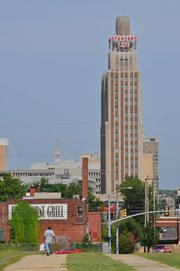Capital Hotel Associates got good news Wednesday when the Jackson Redevelopment Authority authorized a contribution agreement with the city to help fund the developer's Iron Horse Grill and Mississippi Music Experience Museum project.
If the Jackson City Council approves the agreement, it will put JRA and the city at the end of a list of loan guarantors on the project. That means that if the owners of the Iron Horse Grill, along with seven individual backers of the project, cannot pay the loans on the project, the city will get the burden of repayment.
Jason Brookins, JRA's executive director, said the board reviewed the income-tax returns of all seven guarantors for the past three years. JRA was pleased with the financial stability of the project, he said, and was ready to move forward.
The city council will have to approve the agreement for the city to back the project.
Plans for the project include rebuilding the former Iron Horse Grill, which closed in 1999 after two fires left the building in ruins. Along with the restaurant and a live music venue, lead developer Joseph Simpson plans for the building to house a museum dedicated to Mississippi music legends, as well as the headquarters of the Mississippi Blues Trail.
JRA will loan Capital Hotel Associates the largest bulk of the funding for the $5.96 million, 15,000-square-foot project. They agreed to loan the developers $2.5 million, on the basis that they have enough cash-in-hand from other sources to complete the project at the time the parties close on the loan.
The developers will provide about $1.4 million for the project. The remaining $2 million will come from new market and historic tax credits. JRA attorney Zach Taylor said CHA is likely to sell the tax credits, a common practice among developers and banks, to fund to the project. A funding flow chart, created by CHA, shows Trustmark Bank as the project's tax credit investor.
Ward 5 Councilman Charles Tillman said JRA should make CHA's presentation a model for future developers.
"This is one of the better presentations I've seen in a long time," Tillman said. "I like what I see."
JRA has approved building and construction plans for the project. The restaurant and music venue will take up about 10,000 square feet, the museum will be about 4,000 square feet and the headquarters of the Mississippi Blues Trail will take up the remaining 1,000 to 2,000 square feet.
Board member Gregory Green said the board's finance committee approved the contribution agreement with the city before bringing it before the full board.
"We looked at numbers, discussed the numbers, discussed the contributions and we feel, unanimously, that it's a good project," Green said.
JRA board unanimously approved the agreement. Brian Fenelon, Ward 7 JRA representative, abstained from the vote because he works with one of the parties involved in the project, he said.
Newest Farish Plans
Developer David Watkins told the JRA June 27 that his company is prepared to finish construction on four structures planned for the first block of the Farish Street entertainment district.
Watkins told the JRA that a deal with the National Trust for Historic Preservation for $5 million in historic-district tax credits would provide the needed collateral for the funding to finish construction on four of the 13 buildings to be completed on Farish Street between Amite and Grant streets. Watkins said he hopes to close on the tax credits by the end of August.
The tax credits will act as collateral on a $10.2 million bond issue to the Farish Street Group that the city and JRA agreed to in March.
The end-of-August projection for closing on the tax credits is a slight delay from the mid-July date that Jason Goree, vice president of Watkins Development, provided to the JFP in early in May.
Goree also told the JFP in May that the Farish Street Group expected to open four clubs on the street by the end of the year.
When Watkins talked to the JRA June 27, that number was down to one. Watkins said he expects the development's premier venue, B.B. King's Blues Club, to be open by the end of December.
The historic tax credits, unlike new-market tax credits, take effect as soon as the buildings receive a certificate of substantial completion. Watkins said that makes the deal less of a risk to the JRA and the city, because the credits are in no way based on the performance of the businesses once they open.
The developers expect to have at least three other music venues or restaurants open on the street within a couple months of B.B. King's opening. Named for and owned in part by the Mississippi-born blues legend, B.B. King's currently has locations in Orlando, Fla., Memphis, Tenn., Nashville, Tenn., Las Vegas, Nev., and West Palm Beach, Fla.
Plans for the B.B. King's Blues Club on Farish Street include a two-story bar and grill, complete with a stage for live music performances. The third floor of the building will house Itta Bena, a fine-dining restaurant named for the Mississippi Delta town where B.B. King was born.
Farish Street was once the epicenter of African American culture and entertainment in Jackson, but has largely fallen into ruin over the past several decades.
Developers and city officials have discussed revitalizing the street since the early 1980s, but little progress was made before Watkins Development purchased the project in 2008 from Performa Entertainment, the former developer of Beale Street in Memphis.
Comment and email Jacob Fuller at [email protected].



